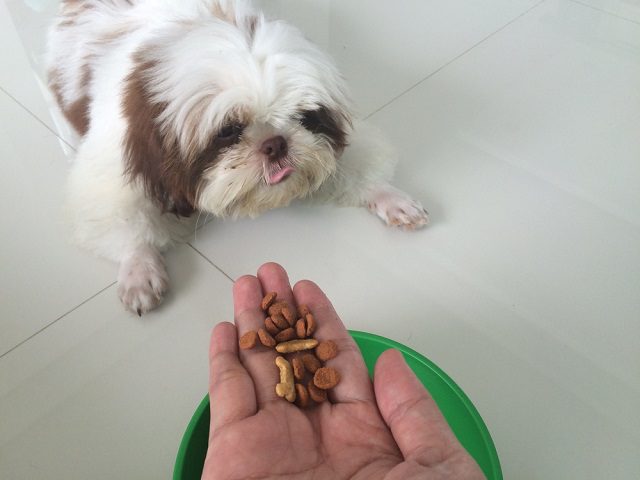Feeding Shih Tzu Puppies: The Ultimate Guide
Shih Tzu puppies are bundles of joy, and ensuring their well-being is a top priority for any pet owner. One crucial aspect of their care is providing them with proper nutrition. This guide aims to shed light on the significance of feeding Shih Tzu puppies a well-balanced diet and its numerous advantages.
Proper nutrition is the cornerstone of a Shih Tzu puppy’s health and development. During their early stages, these adorable furballs are growing physically and mentally. As such, the nutrients they receive are pivotal in shaping their overall health and ensuring they reach their full potential.
Shih Tzu puppies require a diet rich in essential nutrients such as proteins, vitamins, and minerals. These elements contribute to developing strong bones, a shiny coat, and a robust immune system. Additionally, the right balance of nutrients supports cognitive development, helping your Shih Tzu puppy become an intelligent and alert companion.
Advantages of a Well-Balanced Diet
1. Healthy Growth and Development
A well-balanced diet builds up your Shih Tzu puppy’s growth. Proteins aid in muscle development, while calcium and phosphorus support bone growth. A diet tailored to their needs ensures they reach their size and weight milestones healthily.
2. Shiny Coat and Healthy Skin
The quality of a Shih Tzu’s coat often reflects their overall health. A diet rich in omega-3 fatty acids and other essential nutrients promotes a lustrous coat and healthy skin. This not only enhances their appearance but also indicates their well-being.
3. Strong Immune System
A well-nourished Shih Tzu puppy can fend off infections and diseases better. Essential vitamins and minerals, such as vitamin C and zinc, contribute to a robust immune system. This helps your puppy stay active, playful, and less susceptible to common health issues.
4. Optimal Weight Management
Maintaining an ideal weight is crucial for the health and longevity of Shih Tzu puppies. A well-balanced diet and proper portion control ensure they receive nutrients without excess calories. This helps prevent obesity-related health issues and keeps them fit and agile.
Providing your Shih Tzu puppy with a well-balanced diet is an investment in their long-term health and happiness. By understanding the significance of proper nutrition and embracing expert advice, you can set the foundation for a thriving and vibrant companion. Stay tuned for the following sections of our Ultimate Guide, where we delve into specific dietary recommendations and feeding tips for Shih Tzu puppies at different stages of their lives.
Understanding the Nutritional Requirements of Shih Tzu Puppies
Age-Specific Dietary Needs
Shih Tzu puppies undergo rapid growth and development during their early months, and tailoring their diet to their age-specific needs is crucial for their overall well-being. Understanding the nutritional requirements at different stages ensures that they receive the right balance of nutrients for optimal growth.
1. Puppyhood (0-12 months)
During the first year, Shih Tzu puppies require a diet rich in proteins to support the development of muscles and tissues. Essential fatty acids, such as DHA, contribute to cognitive development, while calcium and phosphorus are vital for bone growth. It’s advisable to feed them specially formulated puppy food to meet their needs.
2. Adolescence (1-2 years)
As Shih Tzu puppies transition into adolescence, their energy levels may vary. Adjusting their diet to accommodate their activity level is essential. Continue providing a balanced mix of proteins, fats, and carbohydrates, ensuring they receive the nutrients necessary for continued growth and energy.
3. Adult (2 years and older)
Once Shih Tzu puppies reach adulthood, their nutritional needs stabilize. A diet that maintains a healthy weight supports skin and coat health and sustains overall well-being is crucial. Consider high-quality dog food tailored to small breeds and monitor their calorie intake to prevent weight-related issues.
Essential Nutrients for Growth and Development
1. Proteins
Proteins are the building blocks of a Shih Tzu puppy’s body. High-quality protein sources, such as chicken, turkey, and fish, contribute to muscle development, tissue repair, and overall growth.
2. Fats
Essential fatty acids, including omega-3 and omega-6, are vital for skin health and shiny coat development. These fats also support brain development, promoting cognitive function in Shih Tzu puppies.
3. Vitamins and Minerals
A balanced supply of vitamins and minerals is crucial for various physiological functions. Vitamin A supports vision, vitamin C boosts the immune system, and minerals like calcium and phosphorus are essential for bone health.
Recommended Feeding Schedule
Establishing a consistent feeding schedule is vital to meeting the nutritional needs of Shih Tzu puppies. Here’s a general guide:
1. Puppyhood (up to 6 months)
Feed three to four small meals daily to accommodate their high energy levels and small stomach capacity.
2. Adolescence (6 months to 1 year)
Gradually transition to two meals daily as your Shih Tzu puppy’s growth rate slows.
3. Adulthood (1 year and older)
Continue with two meals daily, ensuring the portions align with their activity level and weight maintenance requirements.
Monitoring your Shih Tzu puppy’s weight and adjusting their diet is essential. Consult with your veterinarian to create a customized feeding plan based on your puppy’s needs, health status, and lifestyle. The proper nutrition ensures a happy, healthy, thriving Shih Tzu companion.
Selecting the Appropriate Food for Shih Tzu Puppies
Commercial Puppy Food vs. Homemade Diets
When nourishing your Shih Tzu puppy, choosing between commercial puppy food and homemade diets is a significant decision that can impact their health and well-being.
1. Commercial Puppy Food
Commercial puppy food is formulated to meet the specific nutritional needs of growing Shih Tzu puppies. These products are convenient, readily available, and often undergo rigorous testing to meet industry standards. Look for reputable brands that list meat as the primary ingredient, avoiding excessive fillers and artificial additives.
Advantages of Commercial Puppy Food
- Balanced nutrition: Commercial puppy food is designed to provide a well-rounded mix of essential nutrients.
- Convenience: Ready-made and easy to portion, commercial food simplifies mealtime for busy pet owners.
- Expert formulation: Reputable brands consult with veterinary nutritionists to develop recipes that cater to the unique needs of Shih Tzu puppies.
2. Homemade Diets
Some pet owners opt for homemade diets, allowing greater control over the ingredients. While this approach can be tailored to specific dietary preferences and restrictions, it requires careful planning to ensure all essential nutrients are included. Consult a veterinarian or canine nutritionist to create a well-balanced homemade diet that meets your Shih Tzu puppy’s requirements.
Advantages of Homemade Diets
- Ingredient control: You can choose specific ingredients based on your Shih Tzu’s dietary needs.
- Limited additives: Homemade diets can minimize preservatives and artificial additives, catering to pets with sensitivities.
Decoding and Comprehending Pet Food Labels
Understanding pet food labels is crucial in making informed decisions about what goes into your Shih Tzu puppy’s bowl. Key points to consider when decoding labels include:
1. Ingredient List
The ingredient list is a window into the nutritional composition of the food. Look for high-quality protein sources like meat, and ensure that essential nutrients are featured.
2. Guaranteed Analysis
This section provides information on the minimum and maximum levels of essential nutrients, such as protein, fat, fiber, and moisture. Ensure these values align with your Shih Tzu puppy’s specific requirements.
3. Avoidance of Fillers
Steer clear of foods that contain excessive fillers, like corn, wheat, and soy, as these may contribute to allergies or digestive issues in some Shih Tzu puppies.
Choosing High-Quality Puppy Food Brands
1. Research and Reviews
Conduct thorough research on different puppy food brands. Read reviews from pet owners, consult with your veterinarian, and consider brands with a reputation for producing high-quality, nutritious dog food.
2. Nutritional Content
Choose puppy food with a well-balanced nutritional profile, including essential proteins, fats, vitamins, and minerals. Opt for options that cater specifically to small breeds like Shih Tzus.
3. Avoid Artificial Additives
Select foods with minimal artificial additives, colors, and preservatives. Natural ingredients contribute to overall health and reduce the risk of sensitivities.
4. Consult Your Veterinarian
Your veterinarian is a valuable resource when selecting the right puppy food for your Shih Tzu. They can provide personalized recommendations based on your puppy’s age, health status, and nutritional needs.
Selecting the appropriate food for Shih Tzu puppies involves carefully considering factors such as the choice between commercial and homemade diets, understanding pet food labels, and choosing high-quality brands. By prioritizing your puppy’s nutritional needs and making informed choices, you can contribute to their overall health and happiness.
Feeding Guidelines for Shih Tzu Puppies
Portion Control and Serving Sizes
Proper portion control is fundamental to ensuring the health and well-being of Shih Tzu puppies. Determining the correct serving sizes considers age, weight, and activity level. Here are essential guidelines for portion control:
1. Age and Growth Stage
Adjust portion sizes based on your Shih Tzu puppy’s age and growth stage. Younger puppies may require more frequent, smaller meals to support their rapid development, while older puppies may benefit from larger, less frequent meals.
2. Weight Management
Monitor your puppy’s weight regularly and adjust portions accordingly. Avoid overfeeding, as excessive weight gain can lead to health issues, including joint problems. Your veterinarian can guide the appropriate weight range for your Shih Tzu.
3. Activity Level
Consider your puppy’s activity level when determining portion sizes. More active puppies may require additional calories, while less active ones may need smaller servings to maintain a healthy weight.
Meal Frequency
Establishing a consistent meal schedule is crucial for the overall well-being of Shih Tzu puppies. Follow these guidelines for meal frequency:
1. Puppyhood (up to 6 months)
Feed your Shih Tzu puppy three to four small meals per day. This accommodates their high energy levels and small stomach capacity during the rapid growth.
2. Adolescence (6 months to 1 year)
Gradually transition to two meals daily as your Shih Tzu puppy’s growth rate slows. This helps regulate their metabolism and prepares them for an adult feeding schedule.
3. Adulthood (1 year and older)
Maintain two meals a day to provide a consistent feeding routine. Ensure the portions align with your Shih Tzu’s activity level and weight management needs.
Transitioning to Solid Food
Transitioning from milk or wet food to solid food is critical in a Shih Tzu puppy’s development.
1. Gradual Introduction
Mix some solid puppy food with their current wet or milk-based diet. Gradually increase the proportion of solid food over several days to allow their digestive system to adjust.
2. Monitor Digestive Health
Pay attention to your puppy’s stool and overall digestive health during the transition. Adjust the transition pace or consult your veterinarian if you notice any signs of upset stomach, diarrhea, or constipation.
3. High-Quality Puppy Food
Choose a high-quality puppy food that meets the nutritional needs of Shih Tzu puppies. Ensure the transition is gradual to avoid digestive issues and support a smooth adaptation to solid food.
Avoiding Common Feeding Mistakes
To promote the best possible health for your Shih Tzu puppy, be mindful of these common feeding mistakes:
1. Overfeeding
Resist the temptation to overfeed, as excess calories can lead to obesity, which may contribute to various health problems. Follow portion guidelines and adjust based on your puppy’s growth and activity level.
2. Inconsistent Feeding Schedule
Establish a consistent feeding schedule to regulate your Shih Tzu puppy’s metabolism and promote a healthy routine. Inconsistencies can lead to digestive upset and disrupt their overall well-being.
3. Inadequate Hydration
Always provide access to fresh water to keep your Shih Tzu puppy well-hydrated. Proper hydration supports digestion, nutrient absorption, and overall health.
4. Ignoring Individual Needs
Each Shih Tzu puppy is unique, and their nutritional needs may vary. Consult with your veterinarian to create a feeding plan tailored to your puppy’s requirements, considering factors such as health status, age, and activity level.
By following these feeding guidelines, you can contribute to the health and happiness of your Shih Tzu puppy. Establishing a balanced and consistent feeding routine, practicing portion control, and being mindful of their needs will set the foundation for a thriving companion.
Special Considerations for Shih Tzu Puppies
Food Allergies and Sensitivities
Like any other breed, Shih Tzu puppies may be susceptible to food allergies and sensitivities. Recognizing and addressing these issues is essential for their overall health and well-being.
1. Common Allergens
Be aware of common allergens in dog food, such as specific proteins, grains, and additives. Monitor your Shih Tzu puppy for signs of allergies, including itching, digestive upset, or changes in behavior.
2. Elimination Diet
If you suspect food allergies, work with your veterinarian to implement an elimination diet. This involves removing potential allergens from your puppy’s diet and reintroducing them one at a time to identify the culprit.
3. Limited Ingredient Diets
Consider switching to limited ingredient or hypoallergenic dog food formulas. These diets minimize the number of ingredients, making it easier to identify and avoid potential allergens.
Dental Care and Chewing Habits
Dental care is critical to Shih Tzu puppy health, as dental issues can impact their overall well-being. Incorporate these practices to promote good oral hygiene:
1. Regular Brushing
Introduce your Shih Tzu puppy to tooth brushing early on. Use a dog-friendly toothbrush and toothpaste to clean their teeth regularly, preventing the buildup of plaque and tartar.
2. Dental Chews and Toys
Provide dental chews and toys designed to promote healthy chewing habits. These aids can help reduce plaque, massage gums, and satisfy your puppy’s instinct to chew.
3. Professional Dental Care
Schedule regular dental check-ups with your veterinarian. Professional cleanings may be necessary to address any dental issues and ensure your Shih Tzu’s teeth and gums remain in optimal condition.
Adequate Water Intake and Hydration
Ensuring your Shih Tzu puppy maintains adequate water intake is vital for their overall health. Hydration plays a crucial role in various physiological functions, and special considerations are necessary for this small breed:
1. Shallow Water Bowls
Provide shallow water bowls to accommodate your Shih Tzu puppy’s flat face. This design helps prevent excessive splashing and makes it easier for them to reach the water.
2. Regular Monitoring
Keep an eye on your puppy’s water consumption, particularly in warm weather or when engaging in heightened physical activity. Small breeds like Shih Tzus may be more susceptible to dehydration, so ensuring they have access to water throughout the day is essential.
3. Wet Food and Hydration
Consider incorporating wet or moistened food into your Shih Tzu’s diet, as it contributes to their overall hydration. However, always provide access to fresh water as the primary source of hydration.
By addressing these particular considerations, you can enhance the health and well-being of your Shih Tzu puppy. Paying attention to potential food allergies, prioritizing dental care, and ensuring adequate hydration are essential components of a comprehensive care routine for these delightful companions. Regular veterinary check-ups can provide additional guidance tailored to your puppy’s needs and health status.
Tips and Tricks for Feeding Shih Tzu Puppies
Creating a Calm and Quiet Feeding Environment
The environment in which your Shih Tzu puppy eats can significantly impact their mealtime experience. Creating a calm and quiet setting contributes to a positive feeding routine.
1. Designated Feeding Area
Establish a specific area for your Shih Tzu’s meals, preferably away from high-traffic zones and loud noises. This provides a sense of routine and helps them associate the space with mealtime.
2. Consistent Feeding Times
Stick to a regular feeding schedule to establish a routine for your Shih Tzu. Predictable mealtimes contribute to a calm environment and help regulate their appetite.
3. Minimal Distractions
Reduce distractions during mealtime. Turn off the TV or radio, and ensure the environment is peaceful. This allows your Shih Tzu to focus on their food and encourages healthy eating habits.
Incorporating Interactive Feeding Toys
Interactive feeding toys make mealtime enjoyable for Shih Tzu puppies, provide mental stimulation and prevent boredom.
1. Food Puzzle Toys
Invest in food puzzle toys designed for dogs. These toys dispense kibble gradually, turning mealtime into a stimulating activity that engages your Shih Tzu’s mind.
2. Slow-Feeder Bowls
Consider using slow-feeder bowls to prevent your puppy from eating too quickly. These bowls have obstacles that encourage your Shih Tzu to eat more slowly, promoting better digestion and reducing the risk of choking.
3. Rotate Toys
Introduce variety by rotating different interactive toys. This keeps mealtime interesting and prevents your Shih Tzu from becoming bored with a particular feeding tool.
Using Treats and Rewards Effectively
Treats and rewards are powerful tools for reinforcing positive behavior and creating a bond between you and your Shih Tzu puppy. Use them effectively during mealtime for training and encouragement.
1. Training Opportunities
Utilize mealtime as a training opportunity by incorporating treats for desired behaviors. This can include commands like “sit” or “stay,” reinforcing good manners during feeding.
2. Healthy Treat Options
Choose healthy treats that complement your Shih Tzu puppy’s diet. Small pieces of vegetables or commercially available dog treats can be used in moderation as rewards without compromising their overall nutrition.
3. Avoid Overindulgence
While treats can be beneficial, it’s crucial to avoid overindulgence. Excessive treats can lead to weight gain and disrupt the balance of your Shih Tzu’s regular meals. Use treats judiciously to maintain a healthy diet.
Implementing these tips and tricks can transform mealtime into a positive and enriching experience for your Shih Tzu puppy. By creating a calm feeding environment, incorporating interactive toys, and using treats effectively, you contribute to their overall well-being and strengthen the bond between you and your delightful canine companion.
Monitoring and Adjusting the Feeding Routine
Regular Weight Checks and Growth Monitoring
Regularly monitoring your Shih Tzu puppy’s weight and growth is crucial to their overall health management. By paying close attention to these factors, you can make informed decisions about their feeding routine.
1. Scheduled Weigh-Ins
Establish a schedule for regular weigh-ins, especially during the first year of your Shih Tzu’s life. This helps track their growth rate and ensures they progress within a healthy weight range.
2. Growth Charts
Keep a growth chart or record of your Shih Tzu puppy’s weight milestones. Compare these against breed-specific growth standards to identify any deviations that may require adjustment to their feeding routine.
3. Consult with Your Veterinarian
If you notice rapid weight gain or loss, consult your veterinarian promptly. Sudden weight changes could indicate underlying health issues or the need for adjustments to their diet.
Consulting with a Veterinarian for Dietary Adjustments
Your veterinarian is invaluable for tailoring your Shih Tzu puppy’s feeding routine to their specific needs.
1. Scheduled Veterinary Visits
Schedule regular veterinary check-ups, during which you can discuss your Shih Tzu’s dietary requirements. These visits allow your veterinarian to assess your overall health and make recommendations for adjustments if necessary.
2. Health Considerations
Inform your veterinarian about any health concerns or changes in behavior. Certain health conditions may necessitate modifying your Shih Tzu’s diet, and your veterinarian can guide the appropriate course of action.
3. Customized Nutrition Plans
Work with your veterinarian to create a customized nutrition plan that aligns with your Shih Tzu’s individual needs. This may include specific dietary recommendations based on age, health status, and activity level.
Adapting the Feeding Routine as the Puppy Grows
As your Shih Tzu puppy matures, their nutritional requirements and feeding routine will evolve. Be proactive in adapting their diet to support their changing needs.
1. Transition to Adult Food
Plan to gradually transition from puppy to adult dog food as your Shih Tzu matures. Adult dogs have different nutritional needs, and a well-timed transition helps support their continued health.
2. Adjusting Portions
Regularly reassess your Shih Tzu’s portion sizes based on age, weight, and activity level. Adjust portions to prevent overfeeding or underfeeding, promoting a healthy weight throughout their life.
3. Consider Special Diets
If your Shih Tzu develops specific health conditions or sensitivities, consider specialized diets recommended by your veterinarian. These diets may address unique nutritional requirements to manage or prevent specific health issues.
Monitoring and adjusting your Shih Tzu puppy’s feeding routine is an ongoing process that requires attention and collaboration with your veterinarian. Regular weight checks, consultations with your vet for dietary adjustments, and adapting the feeding routine as your puppy grows contribute to their long-term health and happiness. By staying proactive and responsive to their evolving needs, you ensure that your Shih Tzu receives the best possible care throughout their life.
Common Feeding Challenges and Solutions
Dealing with Picky Eaters and Food Aversions
Picky eating behaviors and food aversions can pose challenges when feeding Shih Tzu puppies. Here are strategies to address and overcome these issues:
1. Rotate Food Varieties
Introduce variety in your Shih Tzu puppy’s diet by rotating between different high-quality dog food brands and flavors. This prevents boredom and may encourage them to be more accepting of their meals.
2. Gradual Food Transitions
If transitioning to a new type of food, do so gradually by mixing small amounts of the new food with their current diet. This helps acclimate their taste buds and reduce the likelihood of rejection.
3. Avoid Overindulgence
Resist the temptation to offer alternative treats or human food when faced with a picky eater. Doing so may reinforce the picky behavior and lead to nutritional imbalances.
4. Establish a Routine
Create a consistent feeding routine with set meal times. Dogs often respond positively to routine, and a predictable schedule may encourage picky eaters to be more receptive during mealtime.
Preventing Overfeeding and Obesity
Overfeeding and obesity are common issues that can negatively impact the health of Shih Tzu puppies. Take proactive steps to prevent these challenges:
1. Portion Control
Measure your Shih Tzu’s food portions according to their age, weight, and activity level. Follow feeding guidelines provided by the dog food manufacturer and adjust portions to maintain a healthy weight.
2. Scheduled Feeding Times
Avoid leaving food out for free feeding. Instead, establish scheduled feeding times to monitor your puppy’s intake and prevent overconsumption.
3. Incorporate Regular Exercise
Ensure your Shih Tzu gets regular exercise to support weight management. Regular walks, playtime, and interactive activities contribute to overall health and prevent obesity-related issues.
4. Choose Low-Calorie Treats
Opt for low-calorie treats during training or as rewards. This helps control your Shih Tzu’s overall calorie intake and reduces the risk of weight gain.
Addressing Digestive Issues and Food Intolerances
Digestive issues and food intolerances can be expected in Shih Tzu puppies.
1. Gradual Diet Changes
Gradually allow your Shih Tzu’s digestive system to adapt when introducing new foods. Sudden changes may lead to upset stomach, diarrhea, or food aversions.
2. Identify Problematic Ingredients
Monitor your puppy’s reactions to specific ingredients and identify any patterns of digestive distress. Common allergens include specific proteins, grains, or additives.
3. Consult with Your Veterinarian
If digestive issues persist, consult with your veterinarian. They can conduct tests to identify food allergies or intolerances and recommend a suitable diet for your Shih Tzu.
4. Specialized Diets
Consider specialized diets designed for dogs with sensitive stomachs or food intolerances. These diets often feature limited ingredients to minimize the risk of adverse reactions.
By proactively addressing common feeding challenges such as picky eating, overfeeding, and digestive issues, you can foster a positive and healthy feeding routine for your Shih Tzu puppy. Implementing these strategies contributes to their overall well-being and ensures that mealtime remains a positive experience for you and your canine companion.
Conclusion
In conclusion, nourishing your Shih Tzu puppy is crucial to responsible pet ownership. This guide has given you insights into proper nutrition, choosing the right food, and addressing everyday challenges.
By fostering a calm feeding environment, utilizing interactive toys, and adapting to your puppy’s changing needs, you can create a positive mealtime experience. Regular monitoring, consultations with your veterinarian, and thoughtful adjustments to their diet contribute to their overall well-being. By staying informed and proactive, you ensure that your Shih Tzu grows healthy, happy, and cherished in your care.











